Obama calls on Americans to live within their means
At the launch of his 2011 budget US President Barack Obama unveiled proposals that would see spending rise to $3.8 trillion (Euro 2.7 trillion), and push this year’s federal deficit to a historic high of $1.6 trillion, according to reports.
Speaking to the press at the US budget launch Obama said: " We simply cannot continue to spend as if deficits don't have consequences; as if waste doesn't matter; as if the hard-earned tax dollars of the American people can be treated like Monopoly money; as if we can ignore this challenge for another generation. We can't. It's time to save what we can, spend what we must, and live within our means once again.”
“Like any business, we're also looking for ways to get more bang for our buck, by promoting innovation and cutting red tape.”
Obama continued to explain that he’d proposed a fee on big banks to pay back taxpayers for the bailout and would not be extending tax breaks for “oil companies, investment fund managers, and those making over $250,000 a year”.
Below is a summary of media reaction to the US budget.
The Guardian said that the Whitehouse was gambling on economic conditions swinging in its favour. “It hopes that another tranche of stimulus money – $100bn in the form of a jobs bill including tax cuts for small businesses – will begin to bring down the unemployment figures in time for the mid-term elections in November.”
The President ring-fenced military spending and the defence markets reacted positively. “The Standard & Poor's Aerospace & Defense Index GSPAERO gained about 1.5 %,” reported Reuters. "In general it was better than we expected, across the board" in terms of the increases in the base budget as well as weapons procurement spending, Craig Fraser, aerospace and defense analyst for debt rating service Fitch Ratings, told the news agency.
The health-care portion of President Barack Obama's 2011 budget proposal includes $1.4bn to overhaul the nation's food-safety program, $1.6bn to expand child-care programmes, and $1.7bn to fight waste, fraud and abuse, Kathleen Sebelius, secretary of Health and Human Services, told BusinessWeek. The new proposal also includes $1.4bn for improved food safety.
The budget proposal also seeks $10.7bn in development aid to stabilise "frontline states" such as Afghanistan, Pakistan and Iraq, reported the Associated Press. "Development assistance... is a strategic, economic and moral imperative, as central to advancing American interests and solving global problems as diplomacy and defense," the State Department's Jacob Lew told AP reporters.
The new budget called for more money to help Yemen’s security forces. Lew said the money "would enhance Yemen’s air force intelligence, surveillance, and reconnaissance capability, and increase counterterrorism training for the security forces."
Fox News rounded up the key budget stats:
Overall 2011 Spending: $3.834 trillion.
2011 Discretionary Spending: $1.415 trillion.
2011 Projected Deficit: $1.267 trillion or 8.3 percent of GDP (down from $1.556 trillion or 10.6 percent of GDP in 2010).
10-year Deficit Reduction: $1.2 trillion, excluding war savings.
Tax Cuts: More than $300 billion in the next 10 years for individuals, families, and businesses.



















